| No text |
ITALY
1. Tuscany, Umbria, The Marches. Part I
(Click here to go to Part II)
Florence-Siena-Montepulciano-Assisi-Gubbio-
Urbino-Rimini. Km.: 550 - Days: 6 - Month: May
MAP
2. Cycling Around Home
Day 1: Florence to Siena - 60 km.
The title to this paragraph should read more accurately: Prato to Siena.
Prato being the most convenient spot to begin my tour from
that I can actually reach by train from the city where I live -Bologna-
without having to get up at some ungodly hour. Expecially considering that in
fact I live some 30 km. away from Bologna. These, and another 12 km. or so that
I have to ride to get from Prato to Florence, explain why when I finally
reach my destination the odometer of my cyclocomputer reads over 100 km. for the day
(by the way, the distances for each single day have been measured from the map, while
the total at the top of the page is what my computer, which has proved accurate in
all the other circumstances, read after I completed the tour: you will remark the discrepancy).
When I start off from Prato,
I am looking forward first of all to putting the crossing of the Florence urban area
behind me as soon as I can. As I have anticipated, it's far from easy. Luckily,
an obliging fellow cyclist helps me find my way through the worst part,
the industrial belt that links Prato to Florence. Without him, I would probably
have gotten lost. Reaching the banks of the river Arno, I can't resist making
a detour on the Lungarno, instead of taking right away the direction of
Porta Romana, after which the via Senese starts. The traffic along
this road is very heavy, despite the fact that it's only half past two
in the afternoon.
When I find myself finally riding at the foot of the hill on which the imposing
Certosa del Galluzzo is built, I know that I have put the worst part of
the ride behind me.
Emerging from the underpass that crosses the A-1 motorway, I meet the roundabout
where, opposite from the motorway tollbooths, the Chianti Road to Siena
begins. A couple of km. further, after reaching the village of Tavarnuzze,
I take a left turn to begin the climb to Impruneta. It's the first serious
climb, which the heat of the early afternoon makes harder. But I don't want to miss
the spectacular views of Florence lying at the foot of the hills. After Impruneta,
I take the Passo dei Pecorai road to Greve, which isn't exactly easy
to find. Riding on straight through Impruneta will more easily take you to
Strada, while the road to Passo dei Pecorai is both flatter and shadier.
The road stretches on flat terrain until well past Greve, where a second scenic climb
of a couple of km. leads to the hilltop town of Panzano. After an equally
scenic, and a lot more relaxing descent I reach a crossroad, where I take the
Castellina (as opposed to Radda) direction. I find the climb to
Castellina particularly strenuous (maybe the third one always is, I don't know).
After Castellina, however, the road to Siena is mostly downhill, and incredibly
scenic with views over the Chianti hills on the left, the river Elsa valley
on the right, and, finally, right in front, the profile of Siena with its
medieval towers, churches and palaces.
Day 2: Siena to Montepulciano - 65 km.
Again, this chapter should read: Siena to Chianciano, but
of that, more later. Siena has its own Porta Romana, and, as it was
the case in Florence, the route for my second day of riding goes through it.
I leave the town by the Roman via Cassia, descending into the valley
of the river Arbia (in the Middle Ages a favourite battlefield of
the belligerent Senesi). I follow the river until Buonconvento,
and the Cassia as far as S. Quirico d' Orcia, the first stretch being,
as it may be expected, flat, while the second ascends the hilltop upon which
S. Quirico is built. Visiting the Romanic Church with its cool
(as referred to the temperature) interior provides a welcome rest. From S. Quirico
the road unfolds among some particularly scenic hills until it reaches
Pienza, the Renaissance model city built by the Pope Pio II
Piccolomini. I leave Pienza in the early afternoon and head to
Montepulciano. The road rolls on the gentle ondulations
of the plateau that separates the Orcia from the Chiana valleys.
I don't have to wait very long to see the town perched on a hill across a deep
escarpment. A short sprint up the first ramp leading to the town centre
is enough to persuade me to continue my visit on foot. Mostly for logistic
reasons I decide to continue to the next town, Chianciano Terme, which,
as the name implies, is a spa town where accomodation is easy to find, particularly
because May doesn't seem to be peak season for spas around here. The ride is a breeze
anyway as the road is mostly downhill.
Day 3: Montepulciano to Assisi - 90 km.
The next day the first stretch of the road is again downhill until
Chiusi, an exceedingly ancient town of Etruscan origins;
the traffic intensifies as the town approaches, since the road
leads to an intersection with the A-1 motorway. Leaving
Chiusi I turn on the left following the signs that
say Perugia. The road runs straight and flat to the
shores of Lake Trasimeno, among some pleasant countryside.
Despite being a rather important road, it has very little
traffic. The roadway is wide and the maintenance is excellent.
Ideal conditions for making good time. Just before
reaching the lake , I leave the main road and turn right to circle
the lake from the south-east. The reward for a very short and
easy climb is a remarkable view of the lake, whose reed-covered
shores are a sanctuary for numerous species of water birds.
The road is easy to follow until just before Magione.
After that it gets rather confusing. The road signs are no
help as they lead invariably to the four-lane toll-free
motorway to Perugia and Assisi. I follow a road that skirts
the motorway closely, and finally I enter the outskirts of
Perugia, where I discover that my troubles have only just
begun. Perugia is a cyclists' nightmare. Its streets are steep,
its traffic heavy, and the directions simply don't exist.
It is a very beautiful town though, so getting lost in it may provide
some consolations to those that have never seen it. Which is
not my case. Instead, I take advantage of some rough knowledge
of its general layout to manage finally to find a way through,
which entails climbing practically to the top of the hill
just outside the city centre, an arduous climb broken by
numerous stops at the traffic lights (which obviously only
make the going worse). The plunge into the Valle Spoletana
is equally steep. The south industrial belt doesn't offer any
easy way through either. I feel safe only when I reach
Ospedalicchio, where I know that by turning left away
from the Foligno motorway, I'll find myself on a
comparatively quiet road that after a 5 km. long straight
will take me under the walls of Assisi
Go to Part 2
|
No text |

Click on photos to zoom
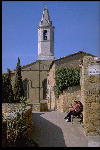
Via dell' amore is Pienza's
stroll with a view
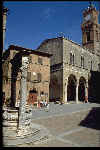
A view of Pienza's main square
with the well and Town Hall...
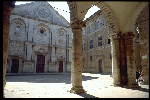
...and another with the famous
facade of the Parish
Church by Rossellino
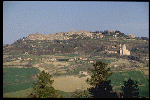
The town of Montepulciano
overlooks Tuscany's
Val di Chiana
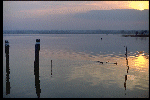
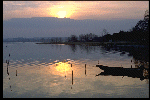
Two pictures of romantic
Lake Trasimeno at sunset
To see some other pics
Go to Part 2
|








